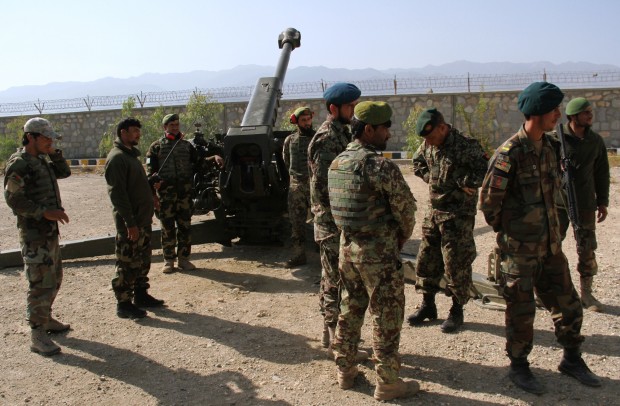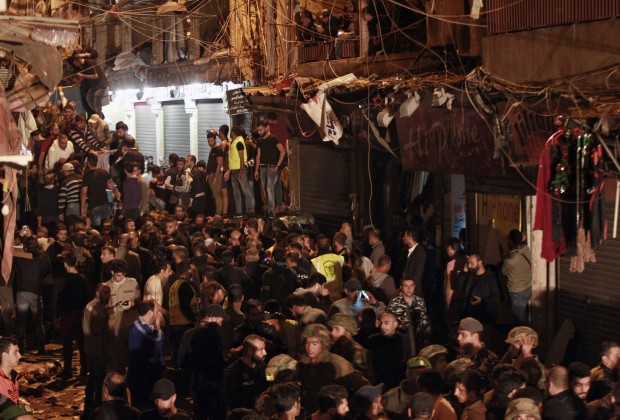ISIS between conspiracy and media coverage

Soldiers stand close to an artillery as Afghan forces launched military operation against the Islamic State (ISIS) in Achin district of eastern Nangarhar province, Afghanistan (Xinhua/Safi)
Now, in 2015 ISIS have managed to spread outside their territory of Iraq and Syria and the Middle East, terrorizing and attacking other countries in other continents, and between conspiracy theories and the difference in reporting their activities in Western and Middle Eastern news outlets, the image of ISIS differs from one recipient to another.
Some news commentators and international newspaper columnists have advocated a strong but measured response to ISIS’s recent provocative acts. Writing for The Guardian, Pankaj Mishra rejects that the group is a resurgence of medieval Islam and rather expresses that, “In actuality, ISIS is the canniest of all traders in the flourishing international economy of disaffection: the most resourceful among all those who offer the security of collective identity to isolated and fearful individuals. It promises, along with others who retail racial, national and religious supremacy, to release the anxiety and frustrations of the private life into the violence of the global.”
The western media tend to focus its spotlight on ISIS attacks related to Europe or the US, as they seem to see any ISIS attack taking place in the Middle East as something taken for granted. We can see the difference in coverage in the recent Paris and Beirut attacks, which happened back to back, both at the hands of ISIS.

Lebanese army and civilians gather near the site of a twin suicide attack in Burj al-Barajneh, southern Beirut, Lebanon, Thursday, Nov. 12, 2015 that struck a Shiite suburb killed and wounded dozens, a Lebanese official said. (AP Photo/Bilal Hussein)
On Thursday 12th November a double bombing rocked Beirut leaving behind over 200 injured and dozens killed, the news coverage whether in Middle Eastern or Western media outlets was fleeting, lasting only a day in focus, despite the fact that ISIS came forward with their responsibility for the attack. Before that bombings in Iraq and Syria were perceived as everyday news especially in Western websites and their international outlets. While in Middle Eastern news websites, the situation didn’t change much as they tend to focus on conspiracy theories related to ISIS more than the actual events.
The next day, Friday 13th came the Paris attacks which left behind over 200 injured and over a 100 killed, and the news coverage was tremendous, whether in Eastern or Middle Eastern news outlets. The world sympathized like they never did before with any ISIS attack, and western media outlets are still reporting on it’s consequences even four days after, the world’s population is sympathizing, and Lebanon grievers already feel forgotten. As the social media starts promoting “Pray for Paris” hashtags, countries like Syria, Lebanon and Iraq feel the prejudice against them.
But the attacks outcome isn’t the only aspect of ISIS that’s heavily reported. Conspiracy theorists in the Arab world have advanced rumors that the U.S. is secretly behind the existence and emboldening of ISIS, as part of an attempt to further destabilize the Middle East. After such rumors became widespread, the U.S. issued an official statement denying the allegations, calling them a complete fabrication. The rumors claim that ISIS leader al-Baghdadi is an Israeli Mossad agent and actor called Simon Elliot and that NSA documents leaked by Edward Snowden reveal this connection. Snowden’s lawyer has called the story “a hoax.”
According to The New York Times, many in the Middle East believe that an alliance of the United States, Israel, and Saudi Arabia is directly responsible for the creation of ISIS. Egyptian, Tunisian, Palestinian, Jordanian and Lebanese news organisations have reported on the conspiracy theory heavily over the year. But this theory haven’t found its place in Western media outlets as it seems that only Middle Eastern ones are focused on relating ISIS to the US.
An example from the Middle East are the heavy reports in Egyptian newspapers such as Al-Ahram, Egypt’s official newspaper. Where there has been a couple of extensive reports on the funding of ISIS. Al-Ahram focused on how ISIS managed to get it’s weaponry thanks to the US and Turkey. That’s a theory that a lot of local newspapers in Egypt and that region like to advocate. ِ
One of the writers for Al-Ahram newspaper, Ibrahim Al-Bahy, published a report speculating the relations between ISIS and Wstern countries, he says, “Western countries have tolerated with ISIS attacks on the Middle East and participating until they came to reap what they sow. The Western countries had a pivotal role in sponsoring ISIS never thinking that it would attack them next, maybe that’s why their attacks on ISIS bases became to be more frequent now that they turned on them.” Another Egyptian newspaper is Al-Watan, and it was among the first media outlets to put forward the claim that ISIS had a role in the Russian plane bombing, even before Western media made public claims.

























































